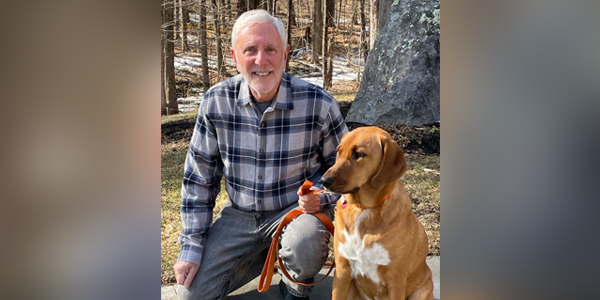Finding meaning in medicine—and in helping others

Mort Salomon (CAMED'77) has recently retired and moved with his wife, Teri, to western Massachusetts. But when he earned his first degree, a bachelor's in history, his path to a successful medical career was anything but clear.
His pursuit of a clinical psychology PhD at the University of Rochester was disrupted by the Vietnam War and the end of graduate-school exemptions and deferments. Salomon was not drafted, but the uncertainty and the hiatus in his education made him look more closely at his goals. A stint working in clinical group therapy made them clear. "I was looking for something that would be more definitively helpful to people, and medicine seemed like an obvious alternative to psychotherapy," he says.
After a short period at Columbia University while working as a research assistant at New York Medical College, Salomon began his medical education at BU. With his family funding his tuition and his savings covering living expenses, he found himself in a better position than many. But national politics entered the equation again. During his four years at BU (1973-77), Congress reduced, and then ended, subsidies for medical training. In those four years, his tuition quintupled.
Amidst ballooning costs and antiwar demonstrations, Salomon bonded strongly with his medical school classmates. He fondly remembers joining a student action to resist the sudden end of pass/fail grading-by taking their exams anonymously and withholding the identity key from faculty.
In addition, during his first year, Salomon heard advice that he kept close throughout his career. Pediatrics Chair Joel Alpert described how medical students in the first two years of school are subject to a lot of scientific education, where those seeking to become clinicians can feel that the emphasis on science might be irrelevant-a tension that's long existed in medical schools. Dr. Alpert advised, "Not everything you're going to learn is relevant. But, as first-year students, you're not in a position yet to know what is relevant and what is not."
"I realized that Joel was correct about that," Salomon says. "Lots of things that seem very esoteric for a first-year student actually come back to inform your thinking about patients later on."
He also recalls formative memories of Dr. Eileen Ouellette. "She took a couple evenings out of her personal life to shepherd us around the pediatric emergency department and talk to us about patients who were there, just to give us clinical exposure," he says of his professor. "In the first months of our education, that was a wonderful gift." BU's lessons had shown Salomon his dual path: pediatrics and emergency medicine.
Salomon became board certified in emergency medicine a few years after it became a specialty in 1979. This led to almost 20 years in the Bronx, culminating with an academic promotion to professor of clinical emergency medicine at Albert Einstein College of Medicine. He was also appointed director of the emergency department at Montefiore Medical Center and executive vice chairman of the newly formed academic department of emergency medicine. Another decade followed at St. Vincent's Medical Center in Bridgeport, Connecticut, where Salomon served first as chairman of emergency medicine and then as the hospital's vice president.
Along the way, he grew increasingly concerned by the rapid inflation of healthcare costs. He wanted to contribute and help blunt the curve of increasing expenses. As medical director of Cotiviti, a medical, technology, and data analytics company, Salomon spent the last leg of his medical career focused on pricing accuracy in healthcare, finding it another concrete way to help people. "My career in medicine has been extremely satisfying to me," he says.
Looking back on his life in medicine and ahead to the plans for his estate, Dr. Salomon thought of the educational institutions that gave him his start. "I felt that helping the medical school to fund the education of other developing doctors was a meaningful gift," he says. So he has provided both for BU and for his undergraduate alma mater.
"My educational opportunities allowed me to have a very meaningful career," he says, "one that provides a lot of social benefit."


